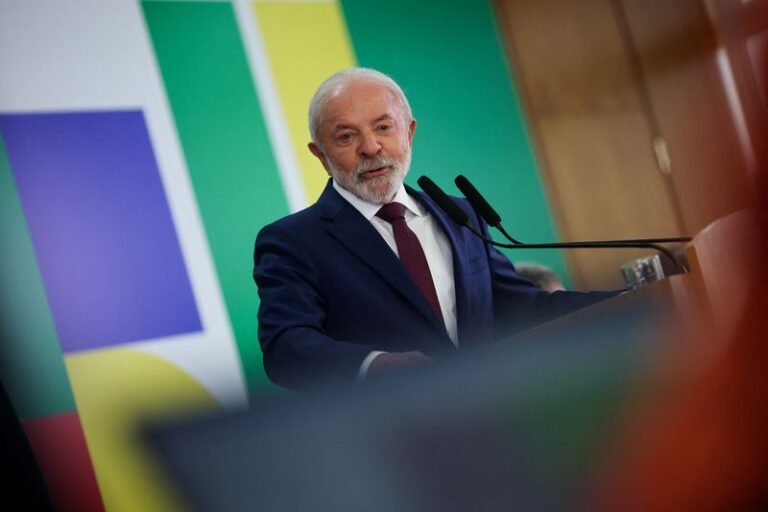Brazil says US crossed ’unacceptable line’ over military strikes on Venezuela
Venezuela: A Trumpian Twist on American Regime Change | Politics
United States President Donald Trump has kicked off the new year with a typically deranged bang by conducting massive air strikes on Venezuela and reportedly capturing the country’s president, Nicolas Maduro, who has apparently been spirited off to an undisclosed location.
The attack does not come entirely as a surprise, given Trump’s track record of doing whatever the hell he wants with no regard for the law – or for his own promise to, you know, stop waging war abroad.
Indeed, Trump has been chattering for months about the possibility of enhanced US military action against Venezuela, as the US has gone about bombing boats willy-nilly off the country’s coast, supposedly in the name of combatting drug trafficking.
This has entailed numerous extrajudicial killings and rampant accusations of war crimes. But, hey, it’s all in a day’s work for an administration that couldn’t care less about legal justification for its behaviour, much less human rights and other such silly concepts.
The US has also hijacked various oil tankers, with Trump unleashing blissfully ludicrous allegations that Venezuela is guilty of stealing US oil, land and assets.
This latest bout of US aggression comes on the heels of decades of US sanctions, which have crippled the Venezuelan economy and which have constituted a form of warfare unto themselves. As of 2020, former UN special rapporteur Alfred de Zayas calculated that 100,000 Venezuelans had already perished as a direct result of coercive economic measures.
According to a post earlier today on X by US Senator Mike Lee of Utah, US Secretary of State Marco Rubio informed him that Maduro has been arrested to stand trial in the United States on criminal charges, and that the air strikes on Venezuela were necessary to protect the US military personnel who were carrying out the arrest warrant.
And while the Trump administration has converted Maduro into the latest international bogeyman and existential menace, this narrative leaves much to be desired. Objectively speaking, the US itself is guilty of far more extensive and comprehensively criminal behaviour than the bumbling Maduro.
Ditto for top US ally Israel, whose leader Benjamin Netanyahu has been repeatedly feted by US presidents over the past two-plus years of Israeli genocide in the Gaza Strip.
Of course, no one in Washington would ever suggest that Netanyahu be bundled off to stand trial in the US, which prefers instead to fling billions of dollars at the Israeli military in order to aid in the mass slaughter.
Oil-rich Venezuela, on the other hand, has long been a thorn in the side of the US empire, starting with Maduro’s predecessor, Hugo Chavez, who propagated such dangerous anti-capitalist ideas as universal healthcare.
Now, the Trump administration accuses Maduro of serving as a ringleader for “narcoterrorism”, which would be laughable if it didn’t result in such large-scale destruction and the flagrant violation of international law.
Obviously, Trump is hardly the only US president in recent history to engage in blatantly illegal action abroad – although he does manage to add a certain dramatic layer of dementedness to everything he does.
One recalls the case of the late Panamanian leader Manuel Noriega, who remained on the CIA payroll for years, despite the US government’s full knowledge of his drug trafficking activities.
When Noriega ceased to be regarded as a valuable anti-communist ally in the 1980s, the US turned on him, spontaneously converting him into the face of evil.
In December 1989, President George H W Bush launched a patently insane attack on Panama, where up to several thousand civilians were killed in the impoverished Panama City neighbourhood of El Chorrillo.
Noriega was eventually captured by US forces in 1990, after his brief stay at the Vatican embassy in the Panamanian capital was rendered unsustainable by the US tanks parked outside. The armoured vehicles’ speakers subjected him to a continuous playlist of musical torture, including singer Jon Bon Jovi’s song Wanted Dead or Alive and Lee Greenwood’s God Bless the USA.
The Panamanian was carted off to stand trial in – where else? – the United States, where the government apparently detected zero hypocrisy in holding its former buddy to judicial account for activities it had previously signed off on.
There was also the war on Iraq in 2003, which was waged on the basis of lies fabricated by Bush’s son President George W Bush and his administration. The US invaded the country, alleging it possessed weapons of mass destruction. Those were naturally nowhere to be found, but the US army nonetheless pulverised various parts of the country and killed hundreds of thousands of Iraqis.
Iraqi President Saddam Hussein was captured, tried and summarily executed by the US-appointed interim Iraqi government.
Indeed, wherever the US has intervened militarily, nothing good has tended to follow. This latest attack on Venezuela will hardly be the end of the story, contrary to Senator Lee’s contention that Rubio anticipates “no further action in Venezuela now that Maduro is in US custody”.
Rest assured that, as US impunity rages on, the deadly spectacle is far from over.
The views expressed in this article are the author’s own and do not necessarily reflect Al Jazeera’s editorial stance.
Introducing the ’empowered non-conformist’: Employees who resist returning to the office on their own terms
The remote work wars are largely over by 2025, but not everywhere. The pandemic-era of white-collar workers logging on from home and staying there all week largely ended in 2024, as bosses decided to call them back in to work as many as 5 days a week. (Amazon was a notable company leading the charge, while Elon Musk famously said remote workers were “pretending” to do their jobs.) But commercial real-estate giant JLL found something new in its September 2025 report on the future of hybrid work: a new remote renegade workplace archetype.
This is not the disengaged quiet quitters of the pandemic era, nor is it a staunch traditionalist. This is what JLL called an empowered “non-compliers”: high-value, highly skilled employees who simply ignore office attendance rules when it doesn’t suit them—and they have the leverage to get away with it.
According to the JLL Workforce Preference Barometer 2025, which surveyed 8,700 office workers globally, a significant disconnect has opened between policy acceptance and actual practice. While 72% of the global workforce views office attendance policies positively, that sentiment does not guarantee they actually show up.
Who are the Non-Compliers?
The report paints a vivid demographic profile of this group. Unlike “compliers,” who tend to be older and value stability, the empowered non-complier is typically younger—often between 30 and 34 years old. They are frequently found in the tech sector, particularly in North America, and often hold managerial roles.
“They are highly trained, recent hires and often managers,” JLL wrote. “Strikingly, they tend to work at companies offering more perks,” such as high-quality offices, childcare, concierge services, free meals, and wellbeing programs. For these workers, JLL continued, non-compliance is often driven by personal constraints rather than a dislike of the office itself (or a disregard for all the free food). Many are caregivers who feel their time constraints are “poorly understood and supported at work,” and commuting is a major factor, too.
High performers, with a skill set to navigate job changes, are a higher flight risk because they know they’re valuable on the open market. “Their non-compliance is less a rejection than a calculated decision based on their sense of empowerment,” JLL concludes, adding that this could change if there’s “turbulence” in the labor market. (Certainly, the emergence of what Federal Reserve Chair Jerome Powell called a “low-hire, low-fire” jobs market would qualify as precisely that kind of turbulence.) The report notes that while compliance with mandates is as high as 90% in France and Italy, it drops to 74% in the U.S., where this “empowered” demographic is concentrated.
The broken psychological contract
The rise of the non-complier signals a broader fracture in the “psychological contract” between employer and employee. The report highlights that burnout has become a serious threat to operations, with nearly 40% of global office workers feeling overwhelmed.
When this implicit contract of being valued is broken, the relationship becomes transactional. Employees stop seeking engagement and start seeking compensation, demanding increased commuting stipends or strictly flexible hours. If the office experience feels “commute-worthy”—offering better technology and amenities than home—acceptance of policies rises. However, almost 40% of global respondents believe their office experience needs improvement, citing issues ranging from noise to a lack of nutritious food.
Two management professors, Peter Cappelli and Ranya Nehmeh, told Fortune in October that they had found a similarly broken contract while researching their recent book on remote work, In Praise of the Office. Nehmeh said they found Gen Z’s behavior in the workplace showed signs of a broken contract between worker and management, as it’s a “very transactional” attitude, which she described as “I show up, I do my job, I get out. I don’t want to be part of anything else.”
Both Cappelli and Nehmeh recommended ending remote work, ironically, because of Gen Z, who are lacking a specific type of mentorship at a crucial point in their careers. “I don’t need to be in the office,” Cappelli said, so he often works remotely. “But I can also see how much worse the place is, because people like me are not in the office, and because we’re not in, the junior people aren’t there either, and so nobody’s there, right?” He described the dynamic as “fine for me … but bad for everyone else.” His findings aligned with JLL’s finding that the empowered non-complier, precisely the sort of high-performing colleague who would be an excellent mentor, that young workers could learn from, are probably not in the office that much themselves.
Ultimately, the empowered non-complier is signaling a shift in what “flexibility” means. It is no longer just about where work happens, but when. Work-life balance has overtaken salary as the top priority for employees globally, cited by 65% of office workers.
The report suggests that successful organizations will stop relying on blanket mandates and instead “personalize the approach.” For the empowered non-complier, retention hinges on autonomy, and JLL recommends that employers move beyond counting days in the office and focus on “management of time over place,” recognizing that for this valuable cohort, flexibility is the new currency of loyalty.
But as Cappelli told Fortune in October, this won’t be an easy thing, because the problems with remote work are really reflective of wider failures on the part of managers. “Management’s just gotten worse,” he said. Commenting on his finding that remote work has resulted in so many meetings that managers are holding post-meeting meetings to make sure the message got through, he added: “It’s a mess. Those things could be fixed, right? But they’re not being fixed.”
The information we have on US attacks in Venezuela
 Reuters
ReutersThe US has captured Venezuela’s President Nicolas Maduro after a large scale strike on the South American country, US President Donald Trump has said.
Trump said Venezuela’s left-wing president and his wife were flown out of the country in a military operation in conjunction with US law enforcement.
His comments came after explosions were reported across capital Caracas in the early hours of Saturday morning, including at military bases.
The Venezuelan government has since demanded proof Maduro is alive. It has also deployed its armed forces and declared a national emergency.
Maduro’s capture comes after heightened tensions between the two countries, with Washington striking boats in the Caribbean it says are being used to carry drugs.
The US has accused the Venezuelan president of being personally involved in drug-smuggling and being an illegitimate leader, while Maduro has accused the US of intimidation.
Here is what we know so far.
What do we know about the operation?
 AFP via Getty Images
AFP via Getty ImagesThere are few details about Maduro’s capture. Trump did not disclose how the Venezuelan president was detained or where he has been taken.
Maduro was captured by the US army’s Delta force – the military’s top counter terrorism unit – according to the BBC’s US news partner CBS.
Trump is due to hold a news conference at his Mar-a-Lago residence in Florida at 11:00 EST (16:00 GMT) at which further details about the operation may be disclosed.
According to Republican Senator Mike Lee, who spoke to US Secretary of State Marco Rubio, Maduro will stand trial on criminal charges in the US.
“He [Rubio] anticipates no further action in Venezuela now that Maduro is in US custody,” Lee said, adding that the strikes were “deployed to protect and defend those executing the arrest warrant”.
Around 02:00 local time (06:00 GMT), loud explosions were heard in Caracas, while plumes of smoke were seen rising over the city.
Videos of explosions and helicopters flying overhead have been circulating on social media, but they have not been verified yet.
Reports of places hit by strikes include military airfield, La Carlota, in the centre of the capital and the main military base of Fuerte Tiuna.
Surrounding communities were also without power.
It is not known if there have been any casualties.
The Venezuelan government also said the states of Miranda, Aragua and La Guaira were also hit.
How has Venezuela reacted?
Venezuela’s Vice-President Delcy Rodríguez said the government did not know where Maduro and his wife, First Lady Cilia Flores, were, and demanded “immediate proof of life” for them both.
The country’s defence minister Vladimir Padrino López claimed the strikes hit civilian areas and said the government was compiling information about dead and injured people.
He added that Venezuela would “resist” the presence of foreign troops.
Venezuela’s government issued an official statement denouncing the “extremely serious military aggression” by the US “against Venezuelan territory and population in civilian and military locations”.
It also accused the US of threatening international peace and stability and described the attack as an attempt to seize “Venezuela’s strategic resources, particularly its oil and minerals” in an attempt to “forcibly break the political independence of the nation”.
What has Donald Trump said?
 Reuters
ReutersImmediately after the explosions, the White House declined to comment publicly.
But Trump later took to his Truth Social platform to confirm the US was behind the strikes.
“The United States of America has successfully carried out a large scale strike against Venezuela and its leader, President Nicolas Maduro, who has been, along with his wife, captured and flown out of the Country,” Trump wrote.
“This operation was done in conjunction with US Law Enforcement. Details to follow.”
The US president described it as a “brilliant operation” to the New York Times in a 50-second phone call.
Asked what he envisioned for Venezuela, he said: “You’re going to hear all about it 11 o’clock.”
Who is Maduro and why has he been captured?
Nicolás Maduro rose to prominence under the leadership of left-wing President Hugo Chávez and his United Socialist Party of Venezuela (PSUV). He succeeded Chávez as president in 2013.
In 2024, Maduro was declared winner of the presidential election, even though voting tallies collected by the opposition suggested that its candidate, Edmundo González, had won by a landslide.
He has been at odds with Trump over the arrival of hundreds of thousands of Venezuelan migrants in the US and the movement of drugs into the US, in particular fentanyl and cocaine.
Trump has designated two Venezuelan drug gangs – Tren de Aragua and Cartel de los Soles – as Foreign Terrorist Organisations (FTOs) and has alleged that the latter was led by Maduro himself.
The US had offered a $50m (£37m) reward for information leading to Maduro’s arrest.
Maduro has vehemently denied being a cartel leader and has accused the US of using its “war on drugs” as an excuse to try to depose him and get its hands on Venezuela’s vast oil reserves.
In recent months, US forces have also carried out more than two dozen strikes in international waters on boats it alleges have been used to traffick drugs into the US. More than 100 people have been killed.
How have other countries reacted?
News of the strikes prompted the strongest reaction from Venezuela’s long-term allies.
Russia accused the US of committing “an act of armed aggression” that was “deeply concerning and condemnable”.
Iran’s foreign ministry called the strikes a “flagrant violation of the country’s national sovereignty”.
Colombian President Gustavo Petro called the strikes an “assault on the sovereignty” of Latin America, while Cuba’s President Miguel Diaz-Canel described it as a “criminal attack”.
Meanwhile, the Spanish foreign ministry called for “de-escalation” and for action to always be taken in accordance with international law, while Germany and Italy said they were closely monitoring the situation.
Challenging Client
A required part of this site couldn’t load. This may be due to a browser
extension, network issues, or browser settings. Please check your
connection, disable any ad blockers, or try using a different browser.
Earthquake Strikes Southern and Central Mexico, Leaving Destruction in its Wake
A 6.5-magnitude earthquake struck southern and central Mexico on Friday, killing and injuring several people and triggering mass evacuations in the capital. Seismic alarms interrupted President Claudia Sheinbaum’s press conference as buildings were rocked across the city.
Published On 3 Jan 2026
Venezuela targeted by US airstrikes following Trump’s warnings to Maduro
US strikes Venezuela after Trump’s threats against Maduro
Deadly 6.5 magnitude earthquake claims two lives in Mexico
At least two people have died after a powerful earthquake hit southern and central Mexico on Friday.
The epicentre of the 6.5 magnitude earthquake was near the popular tourist town of Acapulco, near San Marcos in the south-western state of Guerrero, which suffered moderate damage.
A 50-year-old woman died in Guerrero, the state’s governor Evelyn Salgado said, while Clara Brugada, Mexico City’s mayor, confirmed the death of a 60-year-old man and said 12 others had been injured in the capital.
Mexico is situated in one of the world’s most seismically active areas, sitting at the meeting point of four tectonic plates.
Late on Friday night, Brugada said power has been restored to “98% of the failures reported” in Mexico City.
Two structures were being evaluated for risk of collapse, she said, while 34 buildings and five homes were being inspected as a preventative measure.
Damage assessments are under way in Mexico City after roads and hospitals were impacted, according to news agency Reuters, while authorities noted various landslides on highways around the Guerrero state.
Mexico’s seismological service had registered 420 aftershocks by midday local time (18:00 GMT).
President Claudia Sheinbaum was holding her first press conference of the year when the earthquake struck.
In a video capturing the moment, Sheinbaum can be heard saying “it’s shaking” as an earthquake alert system rings in the background. She then tells the media to “all get out calmly”.
Additional footage shows buildings shaking in Mexico City and cars trembling in Acapulco.
 Getty Images
Getty ImagesAfter hearing the Mexican Seismic Alert System early on Friday, residents and tourists rushed into the streets of Mexico City and Acapulco.
The seismic system was put into place following the deadly 1985 earthquake that claimed more than 10,000 lives.
In 2017, a 7.1 magnitude quake killed more than 200 people and toppled dozens of buildings in Mexico City.
Former communist country introduces euro as official currency for the first time since joining currency union
Bulgarians began withdrawing euros for the first time on Thursday after the former communist nation joined the euro currency union as its 21st member.
Cash machines in the capital, Sofia, dispensed brand new euro banknotes, replacing the lev, which will still be in use for cash payments in January. However, people will receive only euros in change.
The country of nearly 6.7 million people was one of the poorest when it first became a member of the European Union in 2007. Joining the European single-currency system means deeper EU integration after its 1989 transition from a Soviet-style economy to democracy and free markets.
However, the historic milestone arrives amid political instability, with the conservative-led government forced to resign earlier this month following nationwide anti-corruption protests, and skepticism among ordinary people, fueled by fears of price rises.
The government had to beat down inflation to 2.7% earlier this year to comply with EU rules and win approval from EU leaders. But its resignation left the country without a regular budget for next year, hampering reforms and the use of the 27-member bloc’s support funds, fueling protests.
Nationalist and pro-Russian groups in Bulgaria have also exploited fears that the switch to the euro will allegedly lead to more poverty and loss of national identity.
Countries that join the EU commit to the euro, but actually joining can take years and some members are in no hurry. Croatia was the last to join in 2023.
Nico Lahre, 10, Impresses with 10 Event Wins at NBAC Christmas Invite
By Madeline Folsom on SwimSwam

2025 NBAC 51st Christmas Invitational
- December 10-14, 2025
- Loyola University, Baltimore, Maryland
- SCY (25 Yards)
- Full Meet Results Available on Meet Mobile “2025 NBAC 51st Annual Christmas Invitational
The North Baltimore Aquatic Club held their 51st annual Christmas Invitational in the middle of December, and there was some fast swimming across the board.
Boys and Girls Club of Northern Westchester 10-year-old Nico Lahre won 10 events over the course of the meet, setting top 10 times in the country in seven of them and moving up the all-time 10&Under rankings.
His highest ranking swim was the men’s 200 freestyle, where he swam a new personal best time of 2:02.57 to move up to 2nd in the 10&Under boys season rankings. This swim ranks 55th in the all-time 10&Under rankings.
Lahre swam the 4th fastest times in the country in the 100 free (57.55), 100 fly (1:02.38), and 100 IM (1:05.29). Both of these swims also rank in the top 100 all-time with his 100 free sitting at 99th and his 100 fly at 61st.
His 50 fly was 6th in the nation this season (28.70), and he set the 7th fastest times in the 50 back (30.00) and 100 breast (1:15.63).
He also won the 500 free (5:27.92), 100 back (1:02.73), and 200 IM (2:17.59). All three swims were slight adds from his lifetime best times.
Other Notable Performances
- Willa Kulp, North Baltimore Aquatic Club — 13-year-old Willa Kulp had a very good meed in the distance events. She started with a win in the 1000 free, swimming 10:03.20 which ties for 7th in country this season. In the 1650 free, she swam 16:52.15 for the win and 9th in the country. She also swam the 200 fly (2:01.83) to set the 7th fastest time this season and the 400 IM (4:17.52) to move up to 5th. IN the 1000 free, 200 fly, and 400 IM, she is currently the fastest 13-year-old. Kulp also won the 100 fly (56.20) and the 200 IM (2:07.99)
- Jude Burkhart, North Baltimore Aquatic Club — Burkhart took top times in the distance events on the boys’ side, setting top 13-14 times in the country in five events. Like Kulp, he started with a win in the 1000 free at 9:26.99, which is the 6th fastest time in the country this season. He also moved up to 7th in the 1650 (15:51.91), 8th in the 200 back (1:51.36), 8th in the 200 fly (1:52.79). Burkhart also won the 200 free (1:42.65), 100 breast (59.57), 100 fly (51.59), and 200 IM (1:55.51). His 100 breast and 100 fly time were both lifetime bests.
Read the full story on SwimSwam: 10-Year-Old Nico Lahre Shows Off With 10 Event Wins at NBAC Christmas Invite











